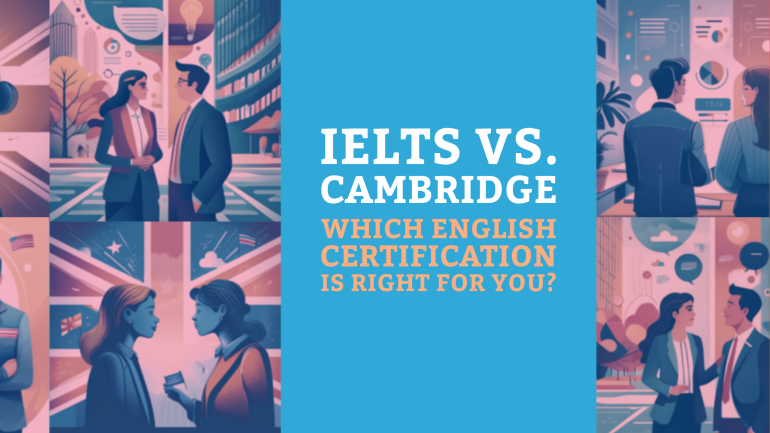Table of Contents
You may also interested:
TL;DR: IELTS vs. Cambridge: Quick Comparison
- IELTS is ideal for academic purposes; Cambridge focuses on practical language skills.
- IELTS offers two versions: Academic and General; Cambridge has multiple levels (A2 to C2).
- IELTS is widely recognized globally; Cambridge is preferred in Europe and among employers.
- Test Format: IELTS includes a face-to-face speaking test; Cambridge emphasizes practical use.
- Consider your goals: Choose based on whether you need it for study or work.
Introduction
Are you planning to take an English certification test but unsure which one to choose? You’re not alone! With the increasing importance of English proficiency in today’s globalized world, many students and professionals find themselves at a crossroads, deciding between two of the most recognized certifications: IELTS and Cambridge English. This blog post will explore the differences between these two certifications, helping students and parents make the best choice for their English learning journey.
Understanding IELTS and Cambridge English Certifications
What is IELTS?
The International English Language Testing System (IELTS) is primarily used for higher education and migration purposes. It offers two versions: Academic and General Training, catering to different needs. The scoring system ranges from 0 to 9, with universities typically accepting scores between 6.5 and 7.5. The test comprises four components: Listening, Reading, Writing, and Speaking, with the speaking test conducted face-to-face, providing a more personal assessment of your conversational skills. IELTS is globally recognized, accepted by over 10,000 organizations worldwide, including universities, employers, and immigration authorities.
What are Cambridge English Qualifications?
Cambridge English Qualifications encompass a series of exams designed for various proficiency levels, including General English and Business English. The tests include A2 Key, B1 Preliminary, B2 First, C1 Advanced, and C2 Proficiency, each targeting different skill levels. The scoring system is graded from A (highest) to C (lowest), with C being the minimum passing grade. The components of the Cambridge exams also include Reading, Writing, Listening, and Speaking, with a strong emphasis on practical language use. These qualifications are widely accepted, particularly in Europe, making them a popular choice among employers.

Key Differences Between IELTS and Cambridge
Target Audience
When it comes to target audiences, IELTS is more popular among students aiming for universities in the UK, Australia, and Canada. In contrast, Cambridge exams are often preferred by employers looking for practical language skills, making them a better fit for those entering the job market.
Test Format and Experience
The test format also differs significantly. IELTS features a face-to-face speaking test, which adds a personal touch and focuses more on academic English. On the other hand, Cambridge offers various levels tailored to different needs, emphasizing practical language use, which can be beneficial for everyday communication.
Recognition and Acceptance
In terms of recognition, IELTS holds a strong global reputation, particularly in academic settings. Cambridge qualifications, while recognized worldwide, have a stronger foothold in Europe and among employers who value practical language skills.
Trends and Insights
Growing Demand for English Proficiency
The demand for English proficiency is on the rise, especially in non-native English-speaking countries. Both IELTS and Cambridge certifications are becoming essential for students and professionals aiming to enhance their career prospects. As globalization continues to shape the job market, having a recognized English certification can significantly boost your employability.
Digital Testing Trends
With advancements in technology, both IELTS and Cambridge are adapting to digital trends, offering online testing options. This reflects the changing landscape of education and assessment, making it easier for candidates to take their exams. The convenience of online testing allows for greater flexibility in scheduling and can reduce the stress associated with traditional testing environments.
Regional Preferences
Regional preferences also play a significant role in the choice between IELTS and Cambridge. IELTS is favored in countries like Australia and Canada, while Cambridge certifications are more widely accepted in Europe, highlighting the importance of considering geographical factors in your decision. Understanding the specific requirements of the institutions or employers you are targeting can guide your choice effectively.
Choosing the Right Certification for You
Consider Your Goals
Before making a decision, consider your goals. Are you pursuing academic opportunities or looking to enhance your professional skills? Understanding your objectives will guide you in selecting the right certification. For instance, if your primary aim is to study abroad, IELTS may be the more suitable option. Conversely, if you are entering the workforce or seeking a promotion, Cambridge qualifications may better demonstrate your practical language abilities.
Cost and Accessibility
Cost is another crucial factor. Compare the expenses associated with taking each test, including preparation materials, and consider the availability of test centers and online options in your area. IELTS and Cambridge exams can vary significantly in price, so it’s essential to factor in your budget when making your decision.
Preparation Strategies
Effective preparation is key to success in either test. Utilize recommended resources, study plans, and practice tests to enhance your skills and boost your confidence. Many candidates find that enrolling in preparatory courses or using online platforms can provide structured guidance and valuable feedback. Additionally, consider joining study groups or forums where you can exchange tips and experiences with fellow test-takers.
Conclusion
In summary, both IELTS and Cambridge English certifications offer unique advantages depending on your personal goals and circumstances. Understanding the key differences between these two certifications is essential for making an informed decision.
Are you ready to take the next step in your English learning journey? Assess your needs and explore local test centers or official websites for more information. Choosing the right English certification could be the key to unlocking new opportunities in your academic and professional life!
FAQs
- What is the main purpose of the IELTS test?
- The IELTS test is primarily used for higher education admissions and migration purposes, assessing English proficiency for academic contexts.
- What levels do Cambridge English qualifications cover?
- Cambridge English qualifications range from A2 Key (beginner) to C2 Proficiency (advanced), catering to various proficiency levels.
- Which certification is more recognized globally?
- IELTS is recognized by over 10,000 organizations worldwide, making it a popular choice for academic and migration purposes.
- How do I choose between IELTS and Cambridge English?
- Consider your goals: choose IELTS for academic studies and Cambridge for practical language skills needed in the workplace.
- Are there online options for taking these tests?
- Yes, both IELTS and Cambridge English offer online testing options, providing flexibility and convenience for candidates.





